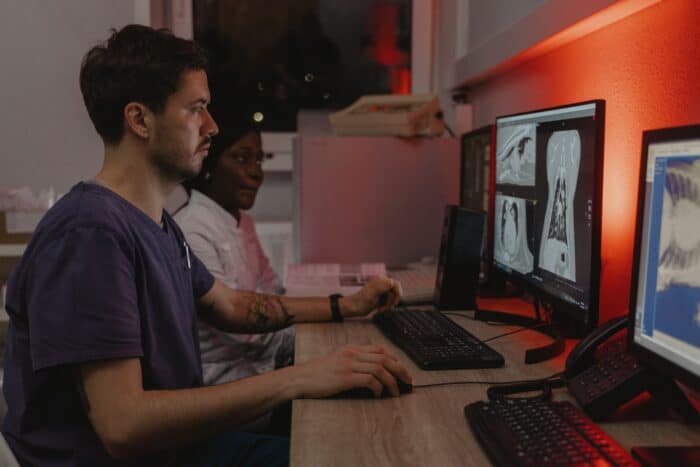Stepping into the field of healthcare can sound intimidating.
However, there are some careers you can opt for that offer the easiest entry into this rewarding industry.
One such career is Medical Assisting.
Medical Assistants are healthcare workers who provide support services for physicians, nurses, and other healthcare professionals.
Their duties include both clinical and administrative tasks.
There are two main types of medical assistants,
- Clinical medical assistants,
- Administrative medical assistants.
The general duties of a medical administrative assistant include scheduling appointments and answering phone calls, among other things. They generally work at the front office and maintain the smooth functioning of the office or clinic.
Also see: 12 Reasons to Become a Medical Assistant
In this article, we will discover more about what medical administrative assistants are, what their roles and responsibilities are, where they work, top medical assistant skills, how much they earn, and more.
Medical Administrative Assistant: Job Duties
Even though a medical assistant generally has to perform both clinical as well as administrative tasks, a medical administrative assistant focuses more on the administrative side of things.
General medical assistant job duties include:
- Maintenance of Patient Records –
Medical administrative assistants are required to maintain and keep updated patient medical health records. This helps physicians provide optimum care to the patients - Acting as a liaison between patients and physicians–
Often, patients who come in are hesitant or nervous and miss important bits while sharing their concerns with the physicians. Medical administrative assistants can act as a bridge and help patients be at ease so there is smooth communication. - Scheduling appointments-
Administrative medical assistants usually handle scheduling and rescheduling appointments. - Answering phone calls –
Medical administrative assistants are the first point of contact for patients when contacting a clinic or doctor’s office. - Billing and Insurance-
Medical administrative assistants generally help patients with billing and insurance claims. - Directing patients to examination or waiting rooms-
As a medical administrative assistant, it is important to maintain a smooth patient flow throughout the clinic, which involves promptly directing patients to their assigned rooms. - Maintaining an organized and fully stocked clinic-
Organization and regular refilling of stocks are extremely important to maintain the smooth functioning of the clinic. Adminstrative Medical Assistants are responsible for that.
If you want to know more about the difference between administrative assistants and clinical medical assistants, check out: CMAA Vs CCMA.
Where Do Medical Administrative Assistants Usually Work?
At some point, you’ve probably thought, where can medical assistants work? Medical administrative assistants typically work in a variety of settings.
Since their roles and responsibilities are focused more on administrative work, they can generally work in places such as hospitals, outpatient clinics, physicians’ offices, or private practices.
The tasks performed by medical administrative assistants also depend on the type of work setting they are in. For instance, if the administrative assistant is working in the hospital,
their typical duties might include scheduling appointments and maintaining patient health records on digital platforms.
Since administrative assistants usually have to sit at the front office, they are less likely to perform physical activities such as standing for long hours as compared to clinical medical assistants.
They usually interact with patients both before and after each visit. Administrative assistants also have the option of working from home, unlike certified clinical medical assistants.
Read: National Certified Medical Assistant NCMA
Skills Required to Become a Medical Assistant
To provide optimum care, medical administrative assistants need to develop both hard and soft skills specific to their job roles.
These skills can make you a valuable medical assistant, and they include:
Hard Skills
- Proficient in basic computer software-
Since medical administrative assistants have to regularly maintain patient health records digitally, they need to have basic proficiency in working with electronic health records and Microsoft Office applications. - Medical coding-
A strong foundation in medical coding and billing is vital for maintaining patient health records. - Good typing speed-
Administrative tasks usually require a lot of typing. A valuable and efficient medical administrative assistant has a good typing speed.
Also see: Medical Assistant vs Medical Billing and Coding
Soft Skills
- Communication-
Good communication skills are extremely important for medical administrative assistants, as they serve as a bridge between patients and physicians. Relaying information such as instructions and policies also requires good communication skills.
- Attention to Detail-
As in any administrative task, you will be required to maintain large volumes of data, including appointment schedules and patient records. You will need to be detail-oriented to spot any inconsistencies within the data that you enter. - Organization-
Being organized is also essential as an administrative medical assistant. This is because you will be subjected to multiple tasks at a time, and being organized will come in handy to prioritize and complete all tasks in time. - Customer service-
Since a medical administrative assistant is the face of the clinic or physician’s office, they also have to deal with patients’ concerns, complaints, and queries. Hence they need to have compassion and patience while resolving any queries or complaints.
Also read: Medical Assistant Certificate Requirements
Day In The Life Of a Medical Administrative Assistant
If you are interested in pursuing your career as a medical administrative assistant, you must be wondering what a typical day in your life would look like. Let us take a look.
A typical workday for medical administrative assistants might begin with them reaching the clinic or office before any patients. They would then begin to set up the front office, check any messages, and review the agendas for the day.
As the patients start to come in, they will greet them and escort them to the assigned rooms. They can also help the patients fill out any paperwork or billing.
After the patient is done with the visit, they can assist them in scheduling their future appointments or with their prescription.
They also check in with their superiors or physicians and may perform the additional tasks assigned to them.
Generally, administrative assistants tend to work full-time, for 40 hours a week. However, their schedules may also differ depending on their work settings. For instance, medical assistant hours in hospitals might be different compared to those in outpatient clinics.
Also read: Medical Assistant Career Path

Do You Want To Become a Medical Assistant? Check Out Free Medical Assistant Masterclass!
In our masterclass you learn:
- How to be a medical assistant faster…in just 4 months!
- Avoid student debt & driving to classes
- #1 thing employers want from Medical Assistants
- How to stand-apart & get a university certificate for a strong resume
How To Become a Medical Administrative Assistant?
Since the field of medical assistance is an entry point into the healthcare industry, the process of becoming a medical administrative assistant is short and easy. (Also read: How to Become a Medical Assistant?)
The normal steps of becoming a medical administrative assistant include:
1. Completing your high school diploma or a GED
While no degrees are required to become a medical assistant, the minimum requirement is to complete your high school diploma or a GED.
Also see: Medical Assistant Degree vs Certificate
2. Complete your medical assistant training
Medical assistant program can be completed in three ways: by getting an associate’s degree from a technical university, getting a diploma from a community college, or opting for certified online training programs.
(Also read: Is Medical Assistant Degree Required?)
Choosing online training programs is highly recommended as it offers several advantages over its alternatives, such as:
- Allows you to complete your training much faster, in as little as 6 months
- Allows you to learn from the comfort of your own home, at your own pace and time schedule
- Costs significantly less than its alternatives, where students don’t have to take on the burden of education loans (See: Medical Assistant Programs Cost)
- Prepares you for certification exams
Read More: How Long does it take to Become a medical assistant?
Medical Administrative Assistant Job Outlook & Salaries
If you are still here and are interested in entering this rewarding career, you might be wondering how much medical administration earns and if pursuing this career is worth it.
Also read: Is Medical Assistant a Good Career?
The U.S. Bureau of Labor Statistics (BLS) reports the national certified medical assistant salary to be $37,450, which comes to around $18 per hour.
These figures are dependent on a lot of factors, such as job location, experience, and education, and might differ from state to state.
Also see: How to get Medical Assistant jobs with no experience
The BLS further reported that the job growth for medical assistants was expected to rise by 16% by the year 2031, which is significantly more than all other professions.
This is bound to increase in the next few years as the demand for medical assistants is constantly on the rise. This makes pursuing a career in medical assistance ideal for people who wish to enter the healthcare industry.
Also see: Medical Assistant Scope of Practice by State
See more on: Medical Assistant Job Outlook
Conclusion
In conclusion, the role of a medical administrative assistant is indispensable in keeping healthcare facilities running smoothly. Their versatile skills in managing schedules, records, and patient interactions form the backbone of efficient medical offices.
From organizing appointments to handling vital paperwork, their contributions ensure the seamless operation of healthcare settings. Their dedication to both administrative tasks and patient support makes them invaluable assets, playing a vital part in delivering quality care and enhancing the overall patient experience.
Additional Resources:
- What is a Medical Assistant
- Pediatric Medical Assistant
- Medical Assistant Vs Nurse
- Medical Laboratory Technician
- CMA vs CNA
- Are Medical Assistant Licenses Required?
- Medical Assistant On-the-Job Training
- Medical Assistant vs EMT
- Medical Assistant Terminology
- Accelerated Medical Assistant Program
- Certified Medical Assistant
- 4 Week Medical Assistant Program
- Cheapest Medical Assistant Program
Related Articles
-
How to Be Successful in College in 2022 – 7 Simple Tips to Succeed
-
How Do Scholarships Work? Read This First…Truth is Shocking
-
7 Best College Majors 2024: What Should I Major In?
-
How to Choose a College – 10 Things You Must Consider in 2024
-
Why Go to College? Top 13 Benefits for Adult Students in 2022
-
Top 5 Best Alternatives to Community College for 2024










